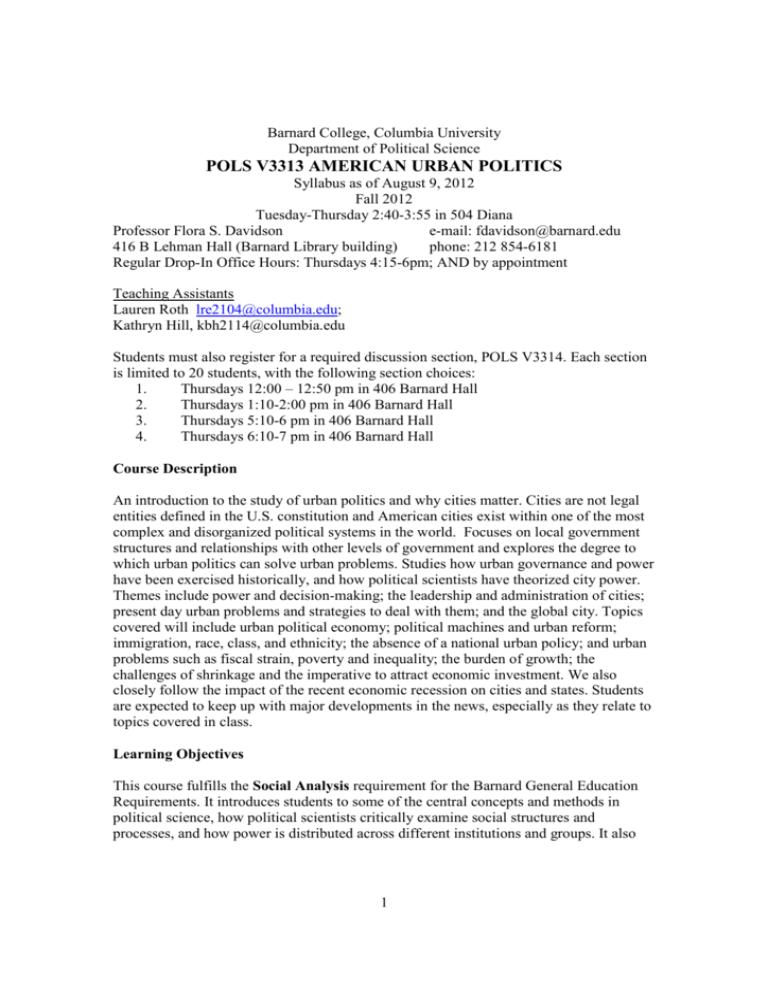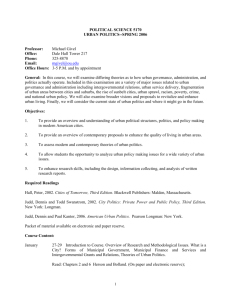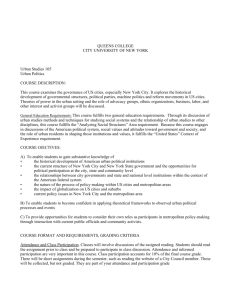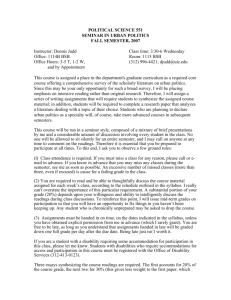
Barnard College, Columbia University
Department of Political Science
POLS V3313 AMERICAN URBAN POLITICS
Syllabus as of August 9, 2012
Fall 2012
Tuesday-Thursday 2:40-3:55 in 504 Diana
Professor Flora S. Davidson
e-mail: fdavidson@barnard.edu
416 B Lehman Hall (Barnard Library building)
phone: 212 854-6181
Regular Drop-In Office Hours: Thursdays 4:15-6pm; AND by appointment
Teaching Assistants
Lauren Roth lre2104@columbia.edu;
Kathryn Hill, kbh2114@columbia.edu
Students must also register for a required discussion section, POLS V3314. Each section
is limited to 20 students, with the following section choices:
1.
Thursdays 12:00 – 12:50 pm in 406 Barnard Hall
2.
Thursdays 1:10-2:00 pm in 406 Barnard Hall
3.
Thursdays 5:10-6 pm in 406 Barnard Hall
4.
Thursdays 6:10-7 pm in 406 Barnard Hall
Course Description
An introduction to the study of urban politics and why cities matter. Cities are not legal
entities defined in the U.S. constitution and American cities exist within one of the most
complex and disorganized political systems in the world. Focuses on local government
structures and relationships with other levels of government and explores the degree to
which urban politics can solve urban problems. Studies how urban governance and power
have been exercised historically, and how political scientists have theorized city power.
Themes include power and decision-making; the leadership and administration of cities;
present day urban problems and strategies to deal with them; and the global city. Topics
covered will include urban political economy; political machines and urban reform;
immigration, race, class, and ethnicity; the absence of a national urban policy; and urban
problems such as fiscal strain, poverty and inequality; the burden of growth; the
challenges of shrinkage and the imperative to attract economic investment. We also
closely follow the impact of the recent economic recession on cities and states. Students
are expected to keep up with major developments in the news, especially as they relate to
topics covered in class.
Learning Objectives
This course fulfills the Social Analysis requirement for the Barnard General Education
Requirements. It introduces students to some of the central concepts and methods in
political science, how political scientists critically examine social structures and
processes, and how power is distributed across different institutions and groups. It also
1
prepares students for advanced undergraduate study in political science and related social
sciences. Students who successfully complete this course will be able to:
•
•
•
•
Describe the history and basic structure of the American political system through
an understanding of local government structures and processes and their
relationships with other levels of government.
Explain the institutions, procedures and actors who function within American
cities and the social forces that shape opportunity and power.
Demonstrate a critical understanding of the distinctive historical, social, political,
demographic and economic forces which have shaped American cities and how
these have changed over time.
Demonstrate a critical understanding of some of the contemporary challenges
confronting cities with regard to fiscal stability, political incorporation, economic
growth and governance in a global era.
SUMMARY OF COURSE REQUIREMENTS
Attendance & Participation in required weekly discussion section POLSV3314
Take-Home Midterm
Book Review selected from a list of books
In class Final Exam during exam period
10%
30%
30%
30%
IMPORTANT DATES TO REMEMBER
Week of September 17:
Weekly discussion sections begin to meet
Tuesday, October 16:
Take Home Midterm distributed in class
Tuesday, October 23:
Take Home Midterm due at beginning of class
Tuesday, November 20:
Book Review due at beginning of class
Thursday, December 4:
Deadline to submit extra-credit response papers
Thursday, December 20
Final Exam from 1:10 – 4pm in room TBA
Readings: Additional articles and other selections may be added to this reading list
during the semester. Changes will be announced in class and on Courseworks. All
readings listed are REQUIRED unless they are clearly labeled as “Recommended.” You
are also urged to do as many of the Recommended readings as possible. You are expected
to purchase the books listed below. ALL other articles and short selections in books are
on Courseworks. Short film clips listed will be screened in class. Separate outside
screenings will be scheduled for longer films. All films listed are also available for
individual viewing in the media collection on the third floor of the Barnard library.
Occasionally, additional articles, handouts, and other selections will be distributed in
class only.
Books: The following books have been ordered at the Columbia University Bookstore
(Barnes & Noble) and are also on reserve at the Barnard Library Reserve Room.
Dennis R. Judd and Todd Swanstrom, City Politics: The Political Economy of Urban
America, 8th edition, (New York: Pearson Longman, 2012 – listed as Judd & Swanstrom
on syllabus
2
William L. Riordan, Plunkitt of Tammany Hall, (New York: Bedford/St. Martins: 1994)
COURSE SCHEDULE
1.
Introduction
Session 1- Tue, Sept 4
Why Study Urban Politics?
Edward Glaeser, Triumph of the City, How Our Greatest Invention Makes Us Richer,
Smarter, Greener, Healthier and Happier, New York: Penguin Press, 2011, Introduction,
pp.1-15.
Session 2 - Thurs, Sept 6
Early Urban History
Dennis R. Judd and Todd Swanstrom, City Politics: The Political Economy of Urban
America, 8th edition, (New York: Pearson Longman, 2012) Ch. 1. The Evolution of City
Politics in America; Ch. 2 The Legacy of America’s Urban Past. pp 1-48.
Film Clip: New York: A Documentary Film: Episode 2: Order & Disorder 1825-1865.
Chapter 4: The Great Migration.
II.
The Politics of Race, Ethnicity and Urban Development
Session 3 - Tue, Sept 11
Machine Politics
Judd & Swanstrom, Ch. 3 Party Machines and the Immigrants pp. 49-75
William L. Riordan, Plunkitt of Tammany Hall, pp. 45-106.
Recommended Reading:
Evan Osnos, “The Daley Show,” The New Yorker, March 8, 2010
Session 4 - Thurs, Sept 13
Machine Politics cont’d
Film Clip: New York: A Documentary Film: Episode 3: Sunshine & Shadow 1865-1898.
Chapter 4: Boss Tweed
Session 5 - Tue, Sept 18
NO CLASS (Rosh Hashana)
Session 6 - Thurs, Sept 20
Reform Politics
Judd & Swanstrom, Ch. 4 The Reform Crusades, pp.76 -110
3
Film Clips: New York: A Documentary Film: Episode 4: The Power & the People 18981918. Chapter 8: The Reform Movement; Chapter 9: The Triangle Shirtwaist Factory
Fire.
Recommended: Wendy Weiser & Lawrence Norden, Voting Law Changes in 2012,
Brennan Center for Justice at NYU School of Law, 2011. Try to at least skim this
important report.
Session 7 - Tues, Sept 25
The Depression, the New Deal and the Rise of National
Urban Policy, Part I
Judd & Swanstrom, Ch. 5 Urban Voters and the Rise of a National Democratic Majority
pp.111-136
Film Clips: New York: A Documentary Film: Episode 6 – The City of Tomorrow 19291941, Ch 2 The Depression, Ch 4 The Little Flower, Ch 5 New York New Deal, &
Ch 7 Building Human Happiness
Session 8 - Thurs, Sept 27
The Depression, the New Deal and the Rise of National
Urban Policy, Part II
David M. Kennedy, “What the New Deal Did,” Political Science Quarterly, Vol 124,
No.2, 2009, pp 251-268.
Session 9 - Tue, Oct 2
Post-War America and the Consequences of National
Policies
Judd & Swanstrom, Ch. 7 National Policy and the City/Suburban Divide, pp. 177-206.
Session 10 - Thurs, Oct 4
Post-War America and the Consequences of National
Policies, cont’d
Thomas J. Sugrue, “Racial Confrontation in Post-War Detroit”, pp. 139-160 in Paul
Kantor and Dennis Judd, American Urban Politics in a Global Age: The Reader, 5th
edition (New York: Pearson Longman 2008).
Robert Moses, “What’s the Matter with New York?” The New York Times Magazine,
August 1, 1943
Jane Jacobs, “Downtown is for People” Fortune, April 1958.
Film Clip: New York: A Documentary Film: Episode 7: The City and the World 19391969. Chapter 4: Moses on the Move.
Session 11 - Tue, Oct 9
Robert Moses – the Quintessential Power Broker
4
“Robert Moses: The Power Broker: Interview with Robert A. Caro” in New York: An
Illustrated History, narrative by Ric Burns and James Sanders, 1st edition (New York:
Knopf, 1999) pp. 458-465.
Herbert Kaufman, “Robert Moses: Charismatic Bureaucrat,” Political Science Quarterly,
Vol. 90, No. 3 (Autumn, 1975) pp. 521-538
Session 12 - Thurs, Oct 11
Robert Moses – the Quintessential Power Broker,
cont’d
Kenneth T. Jackson “Robert Moses and the Rise of New York: The Power Broker in
Perspective,” pp. 67-71 in Hilary Ballon & Kenneth T. Jackson, eds., Robert Moses & the
Modern City, (New York: W.W. Norton & Company, 2007).
Hilary Ballon, “Robert Moses and Urban Renewal,” pp 94-115 in Hilary Ballon &
Kenneth T. Jackson, eds., Robert Moses & the Modern City, (New York: W.W. Norton &
Company, 2007).
Martha Biondi, “Robert Moses, Race, and the Limits of an Activist State,” pp116-121 in
Hilary Ballon & Kenneth T. Jackson, eds., Robert Moses & the Modern City, (New York:
W.W. Norton & Company, 2007).
Robert Fishman, “Revolt of the Urbs: Robert Moses and His Critics” pp. 122-129 in
Hilary Ballon & Kenneth T. Jackson, eds., Robert Moses & the Modern City, (New York:
W.W. Norton & Company, 2007).
III.
Politics, Power & Decision-Making
Session 13 - Tue, Oct 16
Constitutional Framework
Michael J. Rich, “The Intergovernmental Environment” pp 35-67, in John P. Pelissero,
ed, Cities, Politics, and Policy, A Comparative Analysis, (Washington D.C: CQ Press,
2003).
Note: Take Home Midterm distributed at the end of class on Tuesday, October 16.
Session 14 - Thurs, Oct 18
Who Governs and Who Should Govern?
Paul E. Peterson, “The Interests of the Limited City” and Clarence Stone, “Urban
Regimes” pp. 14-42, in Paul Kantor and Dennis Judd, American Urban Politics in a
Global Age: The Reader, 5th edition (New York: Pearson Longman 2008).
Robert Stein, “The Politics of Revenue and Spending Policies,” pp. 217-236 in John P.
Pelissero, ed, Cities, Politics, and Policy, A Comparative Analysis, (Washington D.C: CQ
Press, 2003).
5
Session 15 - Tue, Oct 23
Who Governs and Who Should Govern? cont’d
Elizabeth Strom, “Rethinking the Politics of Downtown Development” Journal of Urban
Affairs, Vol 30, No.1 (2008).
“The Man Segregation Built – The Fall & Rise of a New Black Leadership in Jackson”,
by Ingrid Norten, New American City-Forefront, Vol 1, Issue 15, July 2012.
Note: Tuesday, October 23 - Take Home Midterm due at the beginning of class.
IV.
The Urban Crisis in the late 20th Century- Challenges to Governance
Session 16 - Thurs, Oct 25
Evolution & Devolution of National Urban Policy
Film clips – Eyes on the Prize II: America at the racial crossroads, 1965-1985, Episode
2: Two Societies
Judd & Swanstrom, Ch. 6. The City-Suburban Divide, pp. 138-176 and Ch. 8 Federal
Programs and the Divisive Politics of Race, pp. 207-233.
Session 17 - Tue, Oct 30
Governance and the Politics of Race
“Report of the National Advisory Commission on Civil Disorders” (Excerpts), in
Dennis Judd and Paul Kantor, editors, The Politics of Urban America A Reader, 3rd
edition, (New York: Pearson Longman, 2002) pp. 297-306.
The Negro Family: The Case for National Action (commonly known as the Moynihan
Report.) United States. Department of Labor. Office of Policy Planning & Research,
Washington: USGPO: 1965. Reprinted in 1981 by Greenwood Press.
Recommended: Roberts, Sam, ed., America’s Mayor: John V. Lindsay and the
Reinvention of New York, (New York: Columbia University Press: 2010). Selections by
by Charlayne Hunter-Gault, Nicholas Pileggi and John Mollenkopf.
Session 18 - Thurs, Nov 1
The Urban Crisis & Public Policy in Perspective
The Moynihan Report Revisited: Lessons and Reflections after Four Decades, Douglas
Massey and Robert Sampson (eds), The Annals of the American Academy of Political
and Social Science, California: Sage, January 2009. Selections by James Q. Wilson and
William Julius Wilson, pp 28-46.
William Julius Wilson, “The Political and Economic Forces Shaping Concentrated
Poverty,” Political Science Quarterly, Vol 123, No 4, 2008-09, pp 555-571.
“Inside Job: How the Obama Administration is Reshaping Urban Policy,” by Ben Adler,
Next American City, April 30, 2012.
6
Session 19 - Tue, Nov 6
V.
Election Day – No Class
Governing The Multiethnic Metropolis
Session 20 - Thurs, Nov 8
Suburbanization and the Rise of the Sunbelt
Judd & Swanstrom, Ch. 9. The Rise of the Sunbelt, pp. 212-232; and Ch. 10. The Politics
of Suburban Development, pp 234-259.
Richard Foglesong, “When Disney Comes to Town” in Paul Kantor and Dennis Judd,
American Urban Politics in a Global Age: The Reader, 5th edition (New York: Pearson
Longman 2008).
Andrew Ross, “Kinder, Gentler Government?” in Paul Kantor and Dennis Judd,
American Urban Politics in a Global Age: The Reader, 5th edition (New York: Pearson
Longman 2008).
Session 21 - Tue, Nov 13
Urban Finances, Financial Strain and Crisis
Judd & Swanstrom Ch. 12 The Metropolitan Chase pp. 320-349
Ester R. Fuchs, “The Permanent Urban Fiscal Crisis” pp. 49-73 in Julia Vitullo-Martin,
editor, Breaking Away: The Future of Cities, 1996, The Twentieth Century Fund Press.
Session 22 - Thurs, Nov 15 Urban Finances, Financial Strain and Crisis, cont’d
Ravitch & Volcker, Report of the State Budget Crisis Task Force, July 17, 2012, esp
pages 2-14 and 84-96.
“Welcome to Your New Government – Can Non-Profits Run Cities?” By Anna Clark, in
Next American City, Forefront, Vol 1, Issue 13 (July 2012).
“A Georgia Town Takes the People’s Business Private” by David Segal, The New York
Times, June 23, 2012. (About privatization of city services in Sandy Springs, GA).
Session 23 - Tues, Nov 20
Political Incorporation and Minority Mayors
Note: Book Review due Tuesday, November 20 at beginning of class.
Judd & Swanstrom, Ch 14 Governing the Divided City pp.385-413
Peter Dreier, John Mollenkopf & Todd Swanstrom, Place Matters: Metropolitics for the
Twenty-first Century, 2nd edition revised, (University Press of Kansas: 2004), Chapter 5.
7
Urban Politics & City Limits: What Cities Can and Cannot Do to Address Poverty, pp.
133-172.
James Q. Wilson and George L. Kelling, “Broken Windows,” The Atlantic, March 1982.
F. Santos, “To Be Black at Stuyvesant High,” The New York Times, February 25, 2012.
Session 24 -Thurs, Nov 22
VI.
Thanksgiving Holiday – No class
The Metropolis in the Global Era
Session 25 - Tue, Nov 27
Urban Growth Imperatives: Economic Development
Judd & Swanstrom, Ch. 13. The Renaissance of the Metropolitan Center pp. 350-384.
Richard Florida, “The Power of Place: The Creative Class,” in Paul Kantor and Dennis
Judd, American Urban Politics in a Global Age: The Reader, 5th edition (New York:
Pearson Longman 2008). Pp. 90-104.
Elizabeth Strom, “Culture, Art, and Downtown Development” in Paul Kantor and Dennis
Judd, American Urban Politics in a Global Age: The Reader, 5th edition (New York:
Pearson Longman 2008). Pp. 104-114.
Bruce Katz and Jennifer Bradley, “Mastering the Metro: How Metro Regions Can Win
Friends & Infuence Economies,” Next American City, May 21, 2012.
Session 26 - Thurs, Nov 29 Urban Growth Imperatives: Case Studies
“The Atlanta Beltline: A Green Future” by Ethan Davidson, Public Roads, Sept/Oct2011.
“Welcome to the Sunburst – Could This Be the End of Sprawl in Atlanta?” by Thomas
Wheatley, Next American City, June 4, 2012.
Recommended:
“Driving in Circles: Downtown Providence got rid of its highway. Can it lose its
dependence on cars?” by Yonah Freemark, Next American City, Forefront, Vol 1, Issue
10, June 2012.
Amy Liu & Allison Plyer, “An Overview of Greater New Orleans: From Recovery to
Transformation” in The New Orleans Index at Five, Washington: Brookings Institution
and Greater New Orleans Community Data Center, 2010. pp. 1-13.
Session 27 - Tue, December 4
Cities in the 21st Century
Judd & Swanstrom, Ch. 15 City and Metropolis in the Global Era pp 414-419
8
State of Metropolitan America: On the Front Lines of Demographic Transformation.
Washington: Metropolitan Policy Program at Brookings: 2010. Overview pp.22-35. For
latest data, check website: www.brookings.edu/metro
Session 28 - Thurs, December 6
Conclusion
Review and preparation for Final Exam
COURSE REQUIREMENTS AND GRADING
Attendance & Participation in required discussion section once a week.
10%
All students are required to register for one of four sections of POLS V3314. Discussion
Sections begin meeting during the week of September 17 and are based on discussion
questions to be distributed in advance. Anyone who attends all section meetings (each
student is allowed to miss one section meeting for any reason without penalty) will
automatically receive at least a B as a section grade. Higher grades will be used to reward
active section participation, if that participation demonstrates that the student has
completed and understands the assigned reading. If you must miss a section because of
illness, family emergency, or a religious holiday which prevents you from working on
that day, you must notify your section leader by email in advance and work out an
acceptable makeup assignment, for example by turning in a one page written answer to
one of the discussion questions handed out for the section you missed.
Take-home midterm
30%
The essay questions for the midterm will be distributed in class on Tuesday, October 16.
The questions will be based on assigned readings and lectures through October 11 and
no outside reading will be required. The midterm will be due at the beginning of class on
Tuesday, October 23.
Book Review selected from a list of books
30%
By the end of September, a list of books will be distributed along with guidelines for
writing a book review of no more than 8 to 10 pages (double spaced with one inch
margins). You will select one book from this list and submit your completed review no
later than the beginning of class on Tuesday, November 20.
Final Exam during exam period
30%
The final exam will be held on the official date and time set by Columbia University –
currently projected as Thursday, December 20 from 1:10-4pm. Be sure that your travel
plans enable you to be on campus to take the exam on this day and time. The in class
exam will consist of three sections: Part I is a list of short identification questions; Parts II
and III are two longer essays. In each case the student will be given some choice
concerning which questions to answer. Each student may bring one 81/2” by 11” piece of
paper to the otherwise closed book exam, on which anything may be typed on both sides.
No use of electronic devices such as a laptop, i-pad, notebook, or smart-phone will be
permitted for any reason during the exam unless the student has made prior arrangements
through the Office of Disability Services.
9
Extra Credit Opportunities:
Optional: Attendance and submission of a one - two page response paper for up to TWO
public events or exhibits related to this course during the semester. Your response paper
should be submitted within two weeks of attending the event or exhibit and describe the
date and type of event or exhibit you attended and discuss its relevance to the themes and
issues covered in our course. The DEADLINE for all extra credit response papers is
Thursday December 4, 2012. Announcements of relevant events/exhibits will be
circulated as they become available.
IMPORTANT DATES TO REMEMBER
Week of September 17:
Weekly discussion sections begin to meet
Tuesday, October 16:
Take Home Midterm distributed in class
Tuesday, October 23:
Take Home Midterm due at beginning of class
Tuesday, November 20:
Book Review due at beginning of class
Thursday, December 4:
Deadline to submit extra-credit response papers
Thursday, December 20:
Final Exam from 1:10 – 4pm in room TBA
Honor Code: This course will observe the Barnard College Honor Code. Approved by
the student body in 1912, the Code states:
We, the students of Barnard College, resolve to uphold the honor of the College by
refraining from every form of dishonesty in our academic life. We consider it dishonest to
ask for, give, or receive help in examinations or quizzes, to use any papers or books not
authorized by the instructor in examinations, or to present oral work or written work
which is not entirely our own, unless otherwise approved by the instructor. We consider it
dishonest to remove without authorization, alter, or deface library and other academic
materials. We pledge to do all that is in our power to create a spirit of honesty and honor
for its own sake.
The issue of academic integrity is taken very seriously. If you have any questions about
any aspect of doing honest academic work, please don’t hesitate to ask Prof. Davidson or
the TAs. No question is too minor. Any student found to have violated the Honor Code
will face the disciplinary rules of her or his home college.
Disabilities: Students with disabilities who will be taking this course and may need
disability- related accommodations are encouraged to see Prof. Davidson during her
office hours as soon as possible. Students who need test or classroom accommodations
must be registered in advance with the Office of Disability Services (ODS) at Barnard, or
the Columbia equivalent.
Classroom Etiquette: Our class is an environment conducive to active learning, and any
distractions will undermine this purpose. As a matter of respect for your peers, your
section leaders, and your instructor, please be in your seats by 2:40 pm and I in turn will
end class promptly at 3:55 pm. If circumstances require you to arrive 10 minutes late or
leave early once or twice a semester, please do so unobtrusively and without disruption to
other members of the class. Please do not bring your lunch or noisy, aromatic foods to
10
class. Water and beverages in sealed containers are fine. All cell phones, i-phones,
blackberries or similar electronic devices must be turned off for the full duration of the
class. Students whose phones ring during class will be asked to leave.
Anyone wishing to take notes using a laptop, tablet or i-pad in lecture is expected to sit in
the back half of the classroom so as not to disturb other students. A student may speak to
Prof. Davidson during her office hours to request an exception to this seating rule.
11










